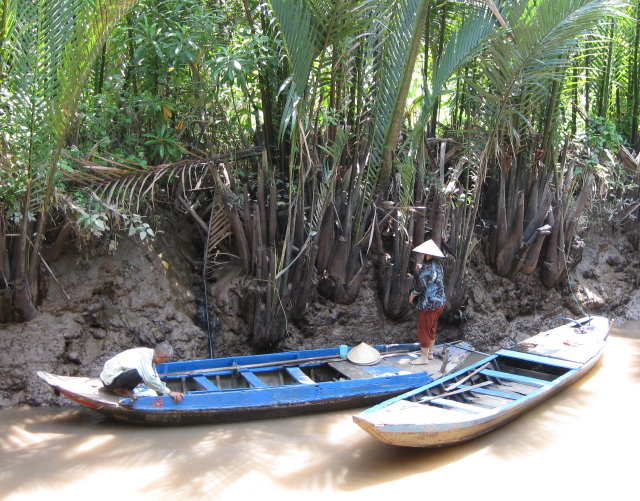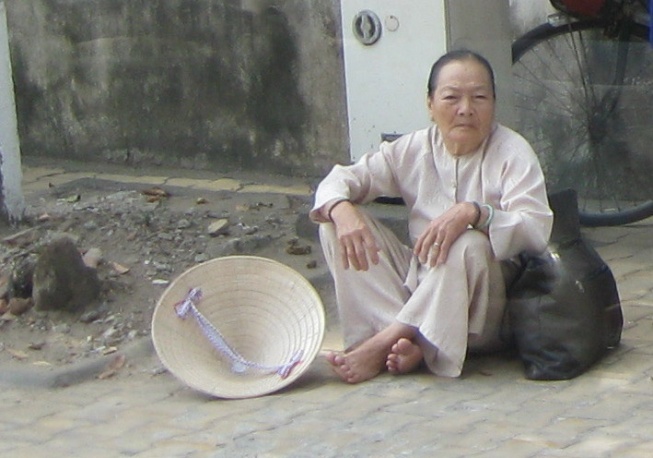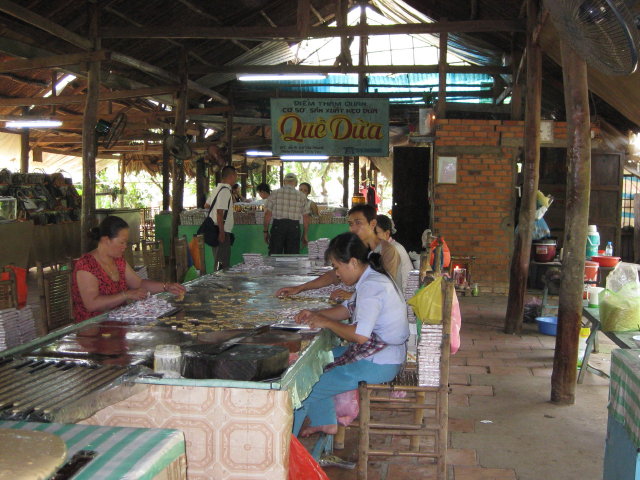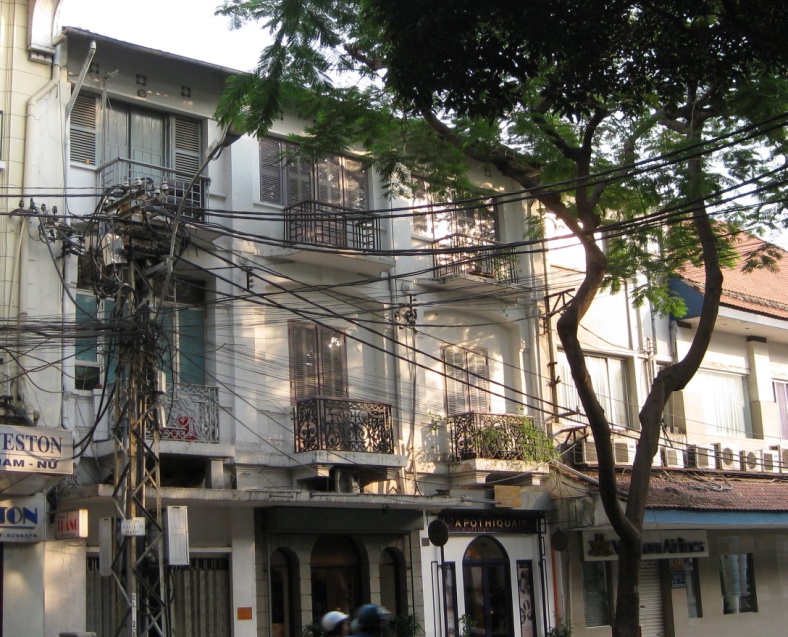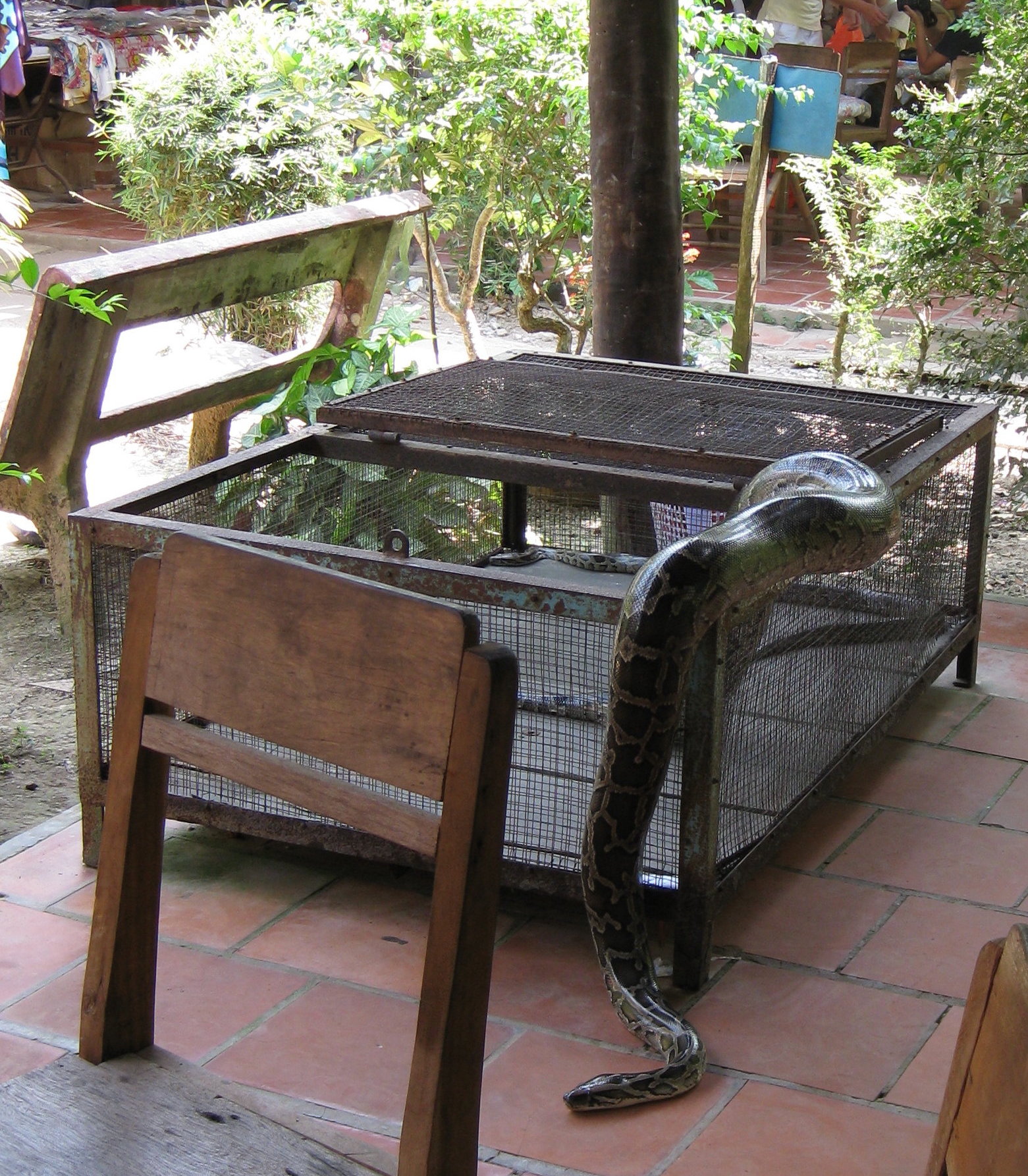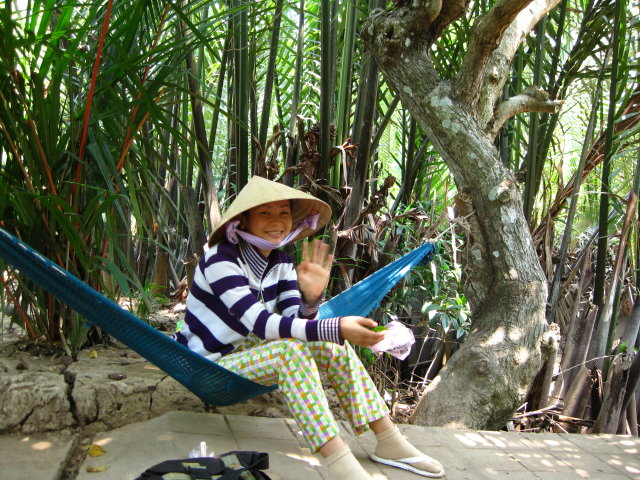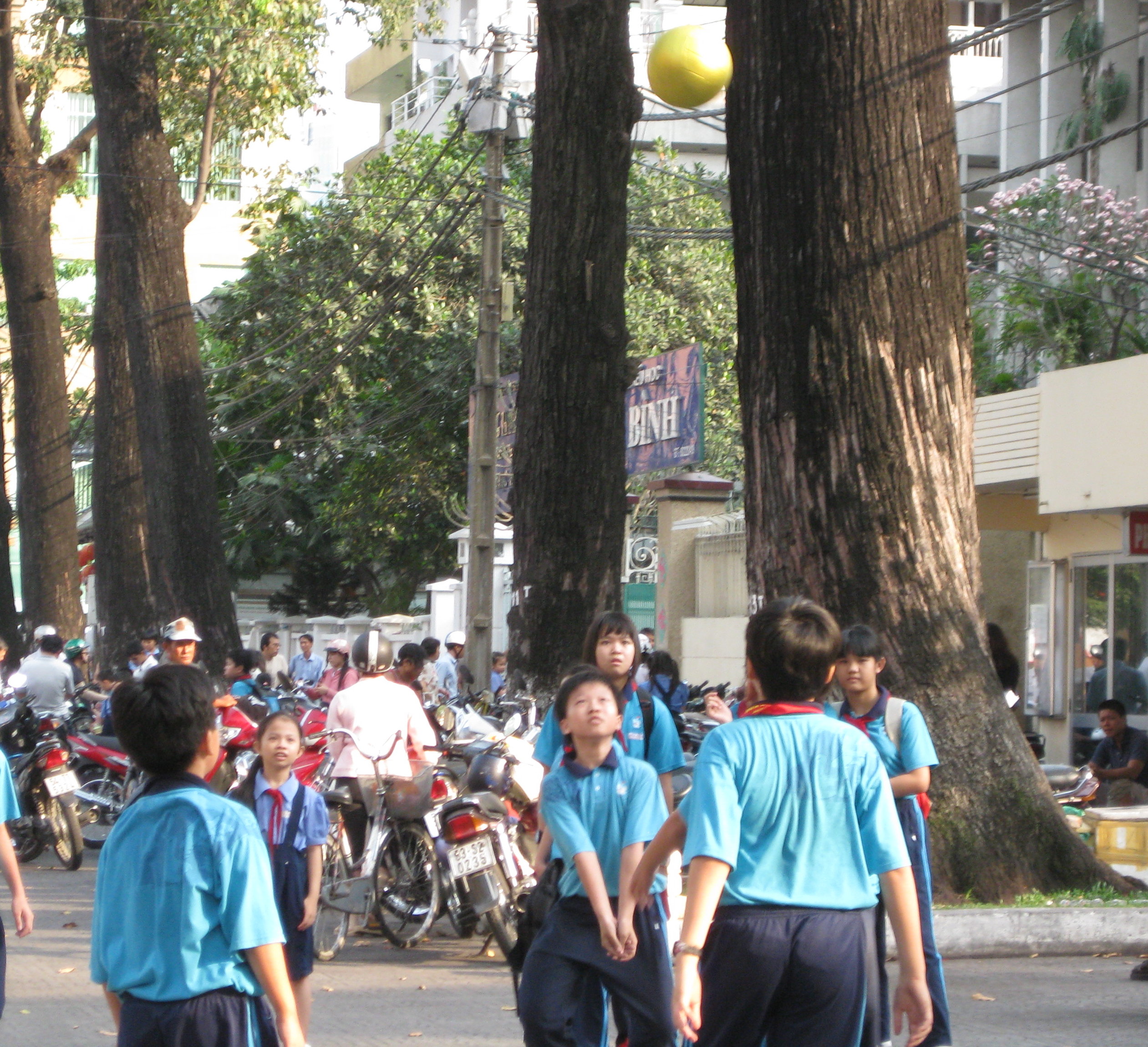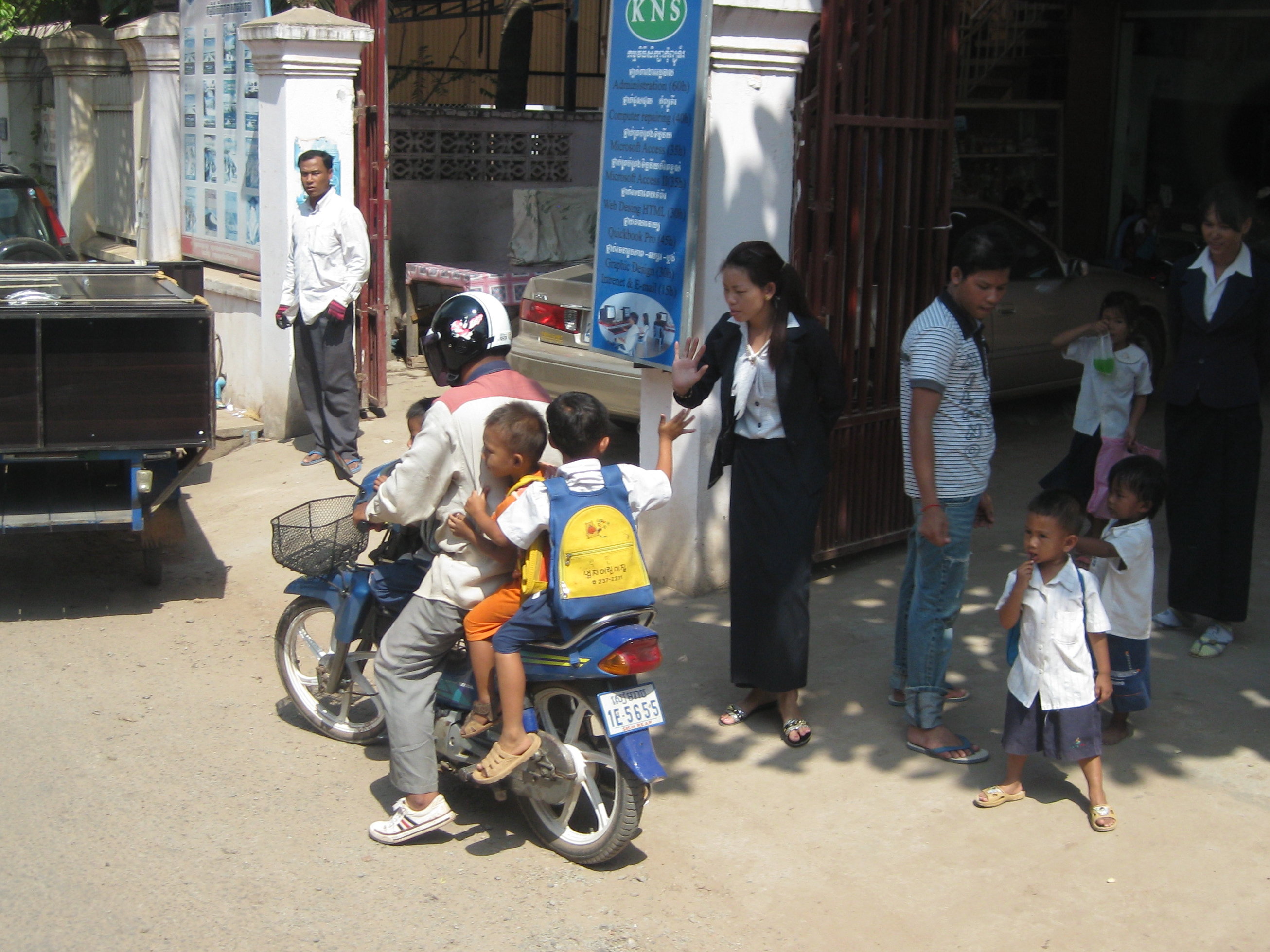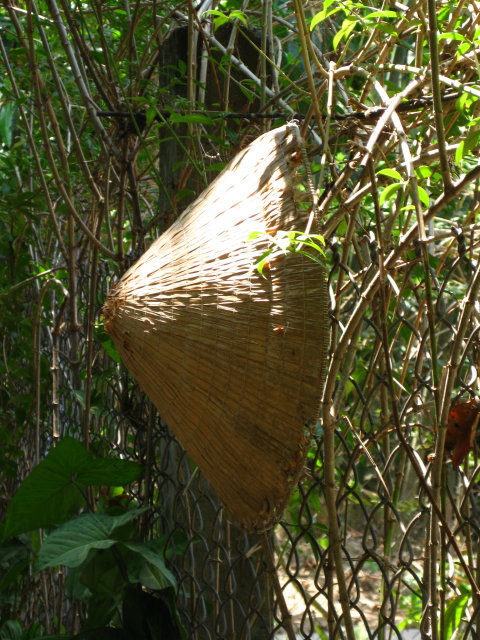Returning from Cambodia, there is an additional day for Vietnam. I am one of three bus leaders for a tour of the Mekong Delta south of Saigon to see an area that is lush with rich soil and good water and extremely dense with people working on farms and fisheries. We travel on the first freeways in Vietnam, the latest just opened last month and closed to motor bikes, so we rest a bit from our constant concern that an errant bike will be crushed by our bus. (Amazingly, none is the entire time we’re there.) The city we head for is about the size of Knoxville but is on a different planet: A mix of smells of everything from fires burning to incense smoldering meets us at every turn; cocks crow; and traffic honks nearly as energetically as in Saigon. I see the first example of an ingenious bicycle powered by hand and with a shade on top for an older lady who calmly carries her wares to market through the traffic. Like Saigon, we never see anyone speed but they steer non-stop around and about and so, again, the number one rule for the pedestrian is to move steadily and surely within or across the stream of traffic.
One of the most unusual features of the agricultural fields and rice paddies are the carefully tended and colorfully painted concrete and stone tombs of the farm families, set in the midst of the planting rows and fruit orchards. After crossing the Mekong River by boat to the My Tho area, we visit a coconut candy factory deep inside a coconut palm jungle. We also take a horse carriage ride, passing water buffalos and small villas housing villagers and the occasional family mausoleum. Stopping for tea we have the opportunity to pose with a python—my friend Nancy takes them up on it but not me; and try snake wine—again, not me. It is very, very hot in the midst of all the marshland, but the shade of water palms is good and we eat a fabulous lunch featuring “elephant’s ear” fish that is delicious, like all of the food we have in Southeast Asia. Finally, we take a small tow boat ride back to the bigger launch to cross the river.
Coming back from the Delta, we encounter the inevitable rush hour traffic in Saigon and so I get off the bus to try to visit a couple more sights in Saigon and just walk before the on-ship time of 1800 that evening. One of the images I’ve tried to catch in each country is of children in school or playing just outside of school or on field trips because of my interest in the future and welfare of the Hot Springs Elementary School and Public Library at home in western North Carolina. Another thing I wind up becoming fascinated by is the power pole wiring which looks more like skeins of thread dropped from above in a tangle. Kenneth would die. His electrical subcontractors would be appalled. But no one else here seems even to notice and expats don’t even seem to know what I’m talking about when I mention it. In one case, I see a truck driver get out and ask a passerby to hold an overhead power supply wire up to the top of his truck so he can drive beneath it. What can I say? It seems to work for them.
I’m conscious of writing more and longer chapters as we proceed on this voyage around the world. Some of that is because, I think, we are further and further away from what is familiar “at home.” But it’s also because the experience of proceeding in such a sequential and rapid way through enormous countries and ancient civilizations means that there is so much to absorb and relate across cultures that goes way beyond the hot button “international” or “foreign policy” issues that are always in the news. Beyond contending with the obvious environmental differences and appreciating the distinctive cultural architecture and artifacts, we are all attempting to learn historical and mental constructs from the onboard academic experts as well as making allowance in our land-based travels for spending time in direct engagement with the people. We find many of the people kind and approachable. Some we find odd. Others are clearly desperate. But, while most are certainly hustling to make a living in countries intent on getting ahead, it takes surprisingly little to get them to step off the production line of the tourism industry for at least a short time and talk about their own individual lives.
In Cambodia, our executive dean and trip leader asks our tour guide to speak a little to our group about his own experience growing up. In a country where people are so young because over 2 million were killed in the fighting of a particularly cruel recent decade—ending only 15 years ago—there is always a story for each survivor. In our guide’s case, he was three years old when he survived the killing of his entire extended family. Yet somehow he went on to college while working several jobs and now heads a family of four children, thus re-establishing his family’s line. He tells the story calmly and factually but he admits that he himself cannot understand how a people as gentle as the Cambodians we encounter in our travels could be capable of violence on such a scale.
While I’m in the mood for deliberating, I want to urge any of you who read this journal who have ever wanted to travel to do so now before you’re any older. While I’ve served as bus or trip leader for many trips in ports so far, I’ve seen too many instances where an older American—Semester at Sea calls our older students “lifelong learners”—has waited much too long to travel. Even with deep pockets at hand, traveling these days is very tough. There are no porters ready and waiting at every juncture because there is no longer a deep-and-wide market for that level of service. If you can’t carry all of it you really can’t bring it—or take it—with you. And if you’re unfit you won’t be able to keep up with the rigorous protocols of everything from airport security to fire drills.
In addition, Americans are almost always the heaviest-weight people in any place we travel—and that, unfortunately, includes our young college students, although there are many fewer in this program as compared to back home, and a number of those few have lost weight. (One or two of the grossly overweight young students don’t venture far from the ship, which is doubly unfortunate.) I don’t think I’ve seen a single Asian that doesn’t appear fit and their diets are certainly much healthier, consisting almost entirely of fish, rice, vegetables and fruit. That will likely change, of course, with increased marketing of Western fast food. But even the Europeans who visit many of the tourist sites with us are not overweight.
While Asians are small, many of them are very strong, but on one of the trips I help manage it takes nearly 5 of them to lift an overweight lifelong learner who is nearly always breathing hard in the tropical heat out of a small rowboat. She doesn’t tip the five fishermen who come springing out of their boats to help her; I do. This poor woman has chosen to go on a number of trips whose itineraries clearly state how physically demanding the trips are. What do they say about: know thyself? At any rate, we are all to the point where we shudder when she comes off the gangway and heads towards our bus.
On the other hand, we have one 88-year-old woman aboard who is fit as a fiddle at the same time as she knows her limits. She has been a joy to get to know.
End of sermonizing. I’ll hang up my hat and stop.
Back on the ship, we look forward to 8 days to prepare to visit India, probably the most daunting of all the countries we will visit. We will need every minute we have to learn and to prepare.


